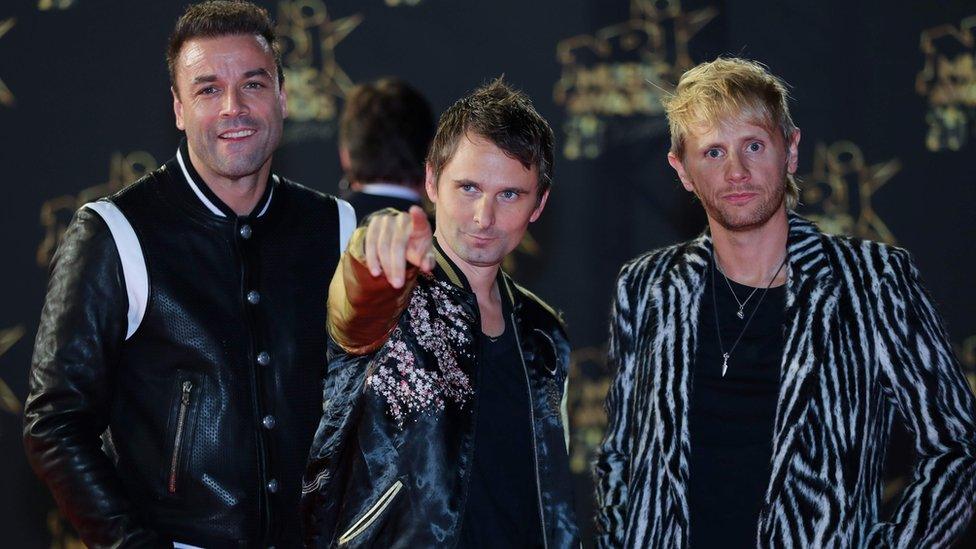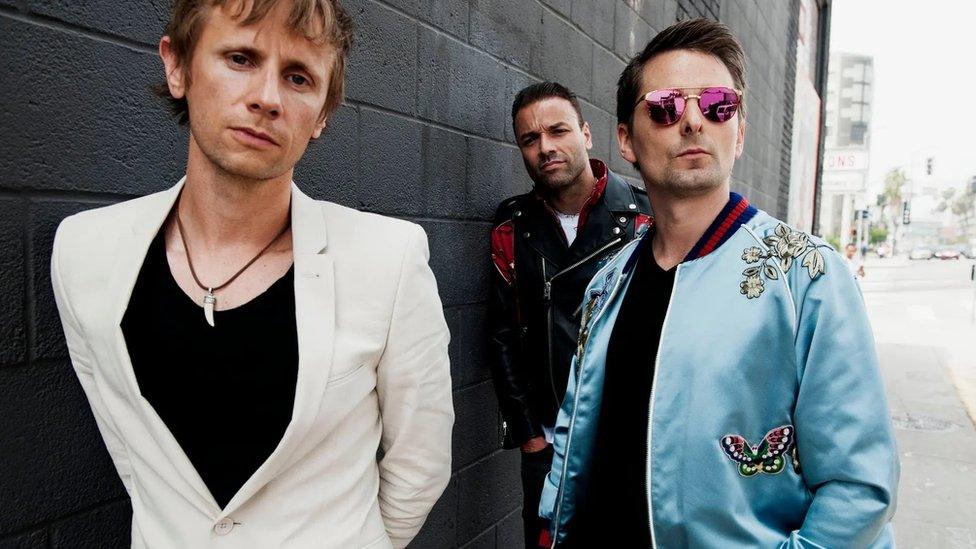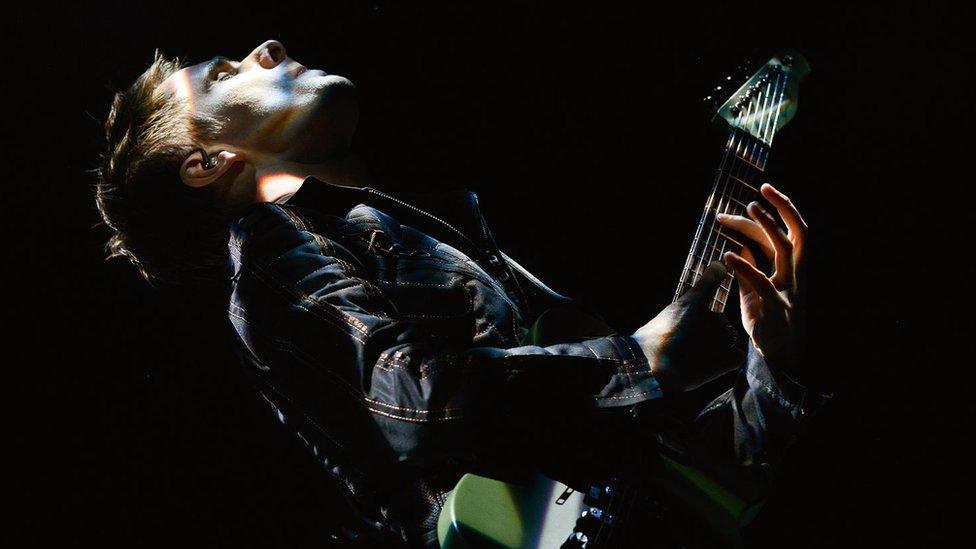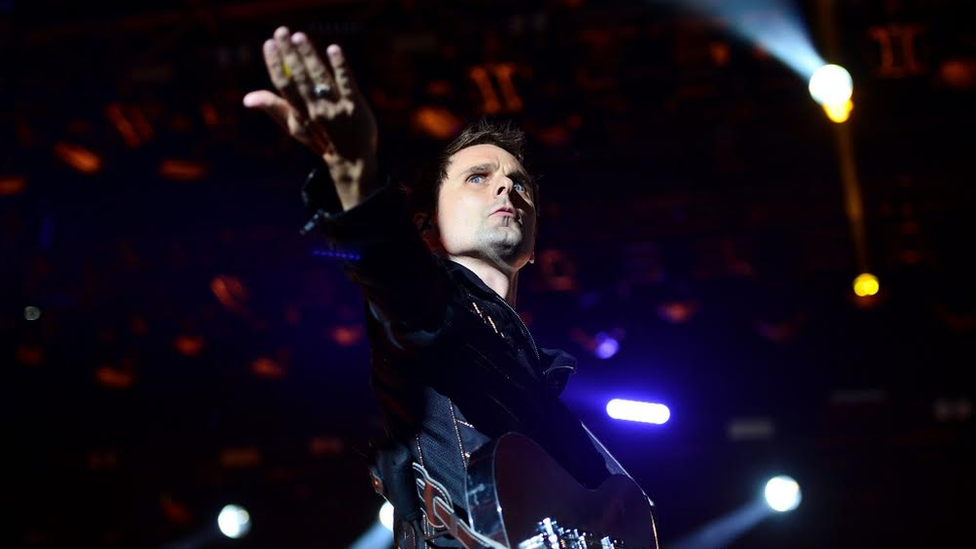Muse interview: 'We are a dying breed'
- Published

Muse (L-R): bassist Christopher Wolstenholme, singer Matthew Bellamy and drummer Dominic Howard
"We always like to find out what the latest pyro is," Matt Bellamy told BBC Radio 1 last year.
He wasn't joking: Muse have always pushed the boundaries of what a live show can achieve; whether it's flying drones over the audience's heads or performing on top of an inverted pyramid.
Their dedication to spectacle is hard-wired into the band's DNA - so much so that Bellamy holds the World Record for the most guitars smashed in a single tour (140, during 2004's Absolution tour).
But the singer says the band's upcoming shows will be "more human" than before.
The 47-date tour, which launches in London's Royal Albert Hall on Monday night, is in support of their eighth album Simulation Theory - which sees the trio tipping their hats to the sci-fi soundtracks of 80s films like Aliens and Back To The Future.
As they prepared for the tour, Bellamy spoke to BBC 6 Music's Amy Zayed in Hamburg about technology, touring and why it's "lonely" to be a rock band in 2018.

This album riffs on the sounds of the 80s. What led you down that path?
When I started making the album, I purchased a virtual reality headset and gaming system. I've never really been much of a gamer - but it blew me away, the feeling of transportation into an alternate world. I found that really fascinating. That correlated with my interest in the TV series Black Mirror and my love of sci-fi - and so it triggered memories of my childhood in the 80s.
What sort of things?
When I was eight or nine, I watched a few films that perhaps I shouldn't have watched at that age - Aliens or The Thing or Blade Runner. And those films had a bigger impact on me than I realised. So the first song on the album, Algorithm, is my invented sound track to a sci-fi film from the 80s.
Then I also got interested in my memories of family films such as Star Wars and Back To The Future and Teen Wolf and I thought to myself, "On the videos for this album, why not create our own little virtual world, where we can go back and visit some of our favourite things from our early childhood?" So it's all linked together.
Allow YouTube content?
This article contains content provided by Google YouTube. We ask for your permission before anything is loaded, as they may be using cookies and other technologies. You may want to read Google’s cookie policy, external and privacy policy, external before accepting. To view this content choose ‘accept and continue’.
You can't have been expecting that when you bought a games console...
I think simulated reality is something that'll become more common in the coming decade. We'll soon be able to live in these online gaming surroundings.
The other thing that fascinated me while I was playing these computer games was that I could talk to random strangers in Russia, Korea or somewhere in America. There was a whole social aspect - and I think that really influenced the sound of the album and gave it the mixture of nostalgia and that futuristic feel.
I immediately thought of Back To The Future when I listened to the album. It was like you'd taken Doc Brown's DeLorean and gone back to the 80s. Especially on a song like Propaganda where it sounds like you're trying to connect to the soul of Prince.
Yeah, basically! And this isn't the first time. We did that on Supermassive Black Hole, too.
But the thing is, I think nostalgia not the same as it used to be. That's a strange thing to say. But when we were in the 90s and 2000s, looking back wasn't something I did very often. But I feel in this decade, nostalgia gives you this funny feeling - you can bring something back but also make it feel like it's for the future. So the feeling is like, "Oh, actually this thing isn't dead. I'm bringing it back to life".
The album seems a lot more optimistic than the dystopian nihilism of Drones and Second Law. Have you changed your mind?
For sure. It might be age, getting slightly older, but there have always been songs of hope buried in Muse albums. Some of our most popular songs, like Uprising, have a positive message for strength and resistance against oppression. Perhaps its been buried under the dystopian nightmares - but on this album, that positive side is definitely coming through.
Allow YouTube content?
This article contains content provided by Google YouTube. We ask for your permission before anything is loaded, as they may be using cookies and other technologies. You may want to read Google’s cookie policy, external and privacy policy, external before accepting. To view this content choose ‘accept and continue’.
You've become known for concept albums... What's the theme this time?
The general idea is that maybe we are already living in a simulation already and we don't know it.
Have you told that to your son? Everything is an illusion...
In some ways, all spiritual and religious thinking is already saying that to children. But I think it can be emboldening. It can give you strength to take more risks; and not to take life so seriously if you start to thinking about it not being the be-all and end-all of everything.
What are the live shows going to be like this time round?
I think I am interested now in making the show involve a lot of additional people. It won't be dance routines - but choreographed theatrics of some kind. We've done a lot with technology - the screens and drones and so on - but I think it is time for us to do something that involves people and get a cast together that brings our songs to life with people performing.

Muse: "We are a dying breed"
When we first spoke in 1999, you were worried no-one would come to see your shows. Now you sell out arenas and stadiums... So is there still a challenge? And if so, what is it?
The challenges are largely the same. It seems like every two or three years the world is a different place so we've always attempted to make "rock" still have a meaning or a purpose or a sense of being. We are trying to bring technology and the instruments that we play together to create a symbiosis rather than opposing forces.
And because the technology is always changing and the political landscape is always changing, the language we have to work with is changing all the time, as well.
It is definitely more lonely than it used to be. I feel like in the 2000s there were so many contemporaries that we had an affinity with, or a friendly competitive spirit with, and that's missing now. But also it gives us the feeling that we are doing something relevant - because we are a dying breed, you know?

Follow us on Facebook, external, on Twitter @BBCNewsEnts, external, or on Instagram at bbcnewsents, external. If you have a story suggestion email entertainment.news@bbc.co.uk, external.

- Published20 February 2018

- Published25 June 2016
